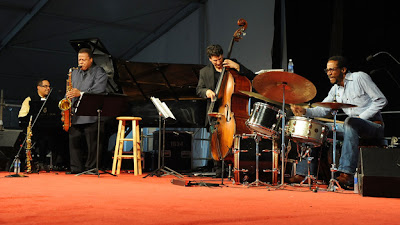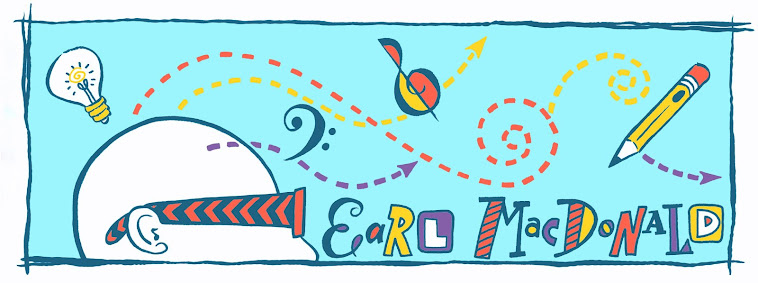It has been just over a week since Wayne Shorter's Carnegie Hall performance with the Orpheus Chamber Orchestra. Since that time, a lot has been said and written about Wayne, but aside from one less-than-favorable New York Times review, eyewitness observations and opinions about the concert have been scarce. Here's mine:
Wayne appeared to be at the top of his musical game, which is impressive considering that he is 80 years old. Sadly, there have been numerous instances in recent memory, when I have gone to hear some of the older statesmen in jazz, and left wishing that I could have remembered them as I did on recordings from the 1960s.
Writing an orchestral suite is no small feat for a person of any age, let alone composing music which is truly spectacular. To my sensibilities, Shorter accomplished near perfection in achieving balance, on several levels. The balance between the jazz quartet's involvement and purely orchestral passages was just right, as were his choices of when, when not, and how to use drum set. Highly cerebral passages were offset by deep, funky grooves that had the entire audience bopping in their seats. I was struck by the beautiful, sweeping woodwind lines under and around larger ensemble hits and punctuations. By no means was this an orchestra providing background pads to a jazz quartet. True interaction was achieved, along with the exertion of strong individual statements from both the chamber ensemble and the jazz quartet.
This was a true example of collaboration working successfully --- when the sum of two separate entities joined together equals something considerably greater. As a composer and improvising musician, it was a performance that left me feeling inspired to experiment and delve into similar, "crossover vein" musical situations. (Stay tuned!!)
Because I have a friend/colleague within Orpheus, I had the rare opportunity to observe two rehearsals, in addition to the concert. This was an interesting experience. For those who may not be in the know, Orpheus is a "conductor-less" ensemble, which rehearses according to a democratic process, whereby members of the group may stand up and make interpretive suggestions. In most situations, I could imagine this process working well. It appeared to me that Shorter wasn't meticulous to detail when it came to writing dynamics, phrasing and articulations. Obviously this lead to many questions. Unfortunately Wayne was despondent and quiet in rehearsal. His responses to simple questions were nonsensical, or on an incomprehensible level to classical musicians who typically deal with absolutes. Bassist, John Patitucci did his best to function as a middle man, but in my opinion, the music would have benefitted from having a fully prepared conductor who could dictate a specific musical interpretation. An incredible amount of rehearsal time was used diplomatically sorting out and debating issues which could have been avoided completely, had someone reviewed and edited the music prior to giving it to the musicians.
After Monday's rehearsal, I couldn't imagine how the music could possibly come together. Much of it hadn't been fully addressed. Wayne barely played in rehearsal and I couldn't help but wonder what his part might sound like. Would he be improvising over the ensemble? Would he be doubling/reinforcing melody passages? Would he lay out as he did in rehearsal?
When I heard them again at Friday afternoon's rehearsal in Carnegie Hall, much had changed. They had rehearsed again in the meantime and had performed a run-through concert in Pennsylvania. Clearly, many issues had been resolved. I was impressed that the members of Orpheus fully committed themselves to bringing the best out of this new music. It was evident that they gave Wayne the respect he deserved as the man who wrote all those great tunes which now constitute the modern jazz canon.
Wayne played with absolute fire! It was a joy to hear his trademark, familiar sound intertwined with, and soaring above the orchestra. Without detracting from their performance, the quartet on the other hand, were more subdued than I have ever heard them. After peeking at the scores backstage, I attribute this to the amount of notes they were reading. I didn't see one chord symbol in Danilo Perez's piano part. It would have be a serious challenge to prepare for any jazz pianist.
Without hesitation I will assert the opinion that Brian Blade is probably the best drummer on the jazz scene today. I can't think of anyone who would have done a better job in this role. Dynamically he never buried the orchestra; yet he took charge and single handedly guided the collective large ensemble in shaping phrases and giving the music life at all the appropriate times. His grooves were infectious.
I am blown away by the level of interaction achieved by this rhythm section. I'm still wrestling to put my finger on what makes them so distinctive as a unit. I question if the amount Patitucci plays (which is more than any bassist I have ever encountered), allows Blade to play gestures, rather than always assuming a traditional timekeeping role. Much more listening needs to take place before I make a definitive assessment, but for now I'm comfortable saying that this trio is doing something truly unique and special which has once again advanced jazz music in its ongoing evolution.
 |
| Wayne Shorter, John Patitucci and the Orpheus Chamber Ensemble |
Writing an orchestral suite is no small feat for a person of any age, let alone composing music which is truly spectacular. To my sensibilities, Shorter accomplished near perfection in achieving balance, on several levels. The balance between the jazz quartet's involvement and purely orchestral passages was just right, as were his choices of when, when not, and how to use drum set. Highly cerebral passages were offset by deep, funky grooves that had the entire audience bopping in their seats. I was struck by the beautiful, sweeping woodwind lines under and around larger ensemble hits and punctuations. By no means was this an orchestra providing background pads to a jazz quartet. True interaction was achieved, along with the exertion of strong individual statements from both the chamber ensemble and the jazz quartet.
This was a true example of collaboration working successfully --- when the sum of two separate entities joined together equals something considerably greater. As a composer and improvising musician, it was a performance that left me feeling inspired to experiment and delve into similar, "crossover vein" musical situations. (Stay tuned!!)
 |
| Orpheus Chamber Ensemble in rehearsal with Wayne Shorter |
After Monday's rehearsal, I couldn't imagine how the music could possibly come together. Much of it hadn't been fully addressed. Wayne barely played in rehearsal and I couldn't help but wonder what his part might sound like. Would he be improvising over the ensemble? Would he be doubling/reinforcing melody passages? Would he lay out as he did in rehearsal?
When I heard them again at Friday afternoon's rehearsal in Carnegie Hall, much had changed. They had rehearsed again in the meantime and had performed a run-through concert in Pennsylvania. Clearly, many issues had been resolved. I was impressed that the members of Orpheus fully committed themselves to bringing the best out of this new music. It was evident that they gave Wayne the respect he deserved as the man who wrote all those great tunes which now constitute the modern jazz canon.
Wayne played with absolute fire! It was a joy to hear his trademark, familiar sound intertwined with, and soaring above the orchestra. Without detracting from their performance, the quartet on the other hand, were more subdued than I have ever heard them. After peeking at the scores backstage, I attribute this to the amount of notes they were reading. I didn't see one chord symbol in Danilo Perez's piano part. It would have be a serious challenge to prepare for any jazz pianist.
 |
| The Wayne Shorter Quartet: Danilo Perez, Wayne Shorter, John Patitucci, Brian Blade |
I am blown away by the level of interaction achieved by this rhythm section. I'm still wrestling to put my finger on what makes them so distinctive as a unit. I question if the amount Patitucci plays (which is more than any bassist I have ever encountered), allows Blade to play gestures, rather than always assuming a traditional timekeeping role. Much more listening needs to take place before I make a definitive assessment, but for now I'm comfortable saying that this trio is doing something truly unique and special which has once again advanced jazz music in its ongoing evolution.

No comments:
Post a Comment